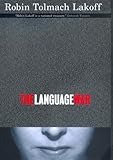The language war / Robin Tolmach Lakoff.
Material type: TextPublication details: Berkeley : University of California Press, 2000.Description: x, 322 p. ; 24 cmISBN:
TextPublication details: Berkeley : University of California Press, 2000.Description: x, 322 p. ; 24 cmISBN: - 0520222962 (alk. paper)
- 9780520222960 (alk. paper)
- 0520216660
- 9780520216662
- 467.973
- P 40.45 L192l 2000
| Item type | Current library | Home library | Collection | Shelving location | Call number | Vol info | Copy number | Status | Date due | Barcode |
|---|---|---|---|---|---|---|---|---|---|---|
 Libro
Libro
|
Biblioteca Juan Bosch | Biblioteca Juan Bosch | Humanidades | Humanidades (4to. Piso) | P 40.45 L192l 2000 (Browse shelf(Opens below)) | 1 | 1 | Available | 00000075547 |
Includes bibliographical references (p. 283-312) and index.
Language: the power we love to hate -- The neutrality of the status quo -- "Political correctness" and hate speech: the word as sword -- Mad, bad, and had: the Anita Hill / Clarence Thomas narrative(s) -- Hillary Rodham Clinton: what the Sphinx thinks -- Who framed "O.J."? -- Ebonics: it's chronic -- The story of ugh.
"Lakoff shows that the struggle for power and status at the end of the century is being played out as a war over language. Controlling language is a basis for all power, she says, and therefore, it's worth fighting for. As a result, newly emergent groups, especially blacks and women, are contending with middle-to-upper-class white men for a share in "language rights." Lakoff's introduction to linguistic theories and the philosophy of language lays the groundwork for an exploration of news stories that meet what she calls the UAT (Undue Attention Test). As the stories became the subject of talk-show debates, late-night comedy routines, Web sites, and magazine articles, they were embroidered with additional meanings, depending on who was telling the story. Race, gender, or both are at the heart of these stories, and each one is about the right to construct meanings from language - in short, to possess power. Because language tells us how we're connected to one another, who has power and who doesn't, the stories reflect the language war."--BOOK JACKET.


There are no comments on this title.